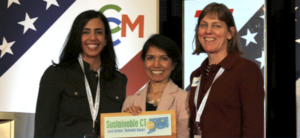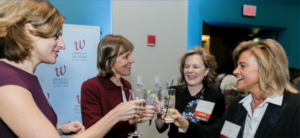At the heart of all environmental work is people. And the voices of people, especially those who have been disenfranchised, must be elevated in order to create equitable solutions to environmental crises. One woman had the courage to not only recognize, but fulfill this need for Connecticut by mobilizing state and local leaders to join forces and create the state’s first ever municipal certification program that is equally sustainability and people centered.
During my internship with Sustainable CT, I have gotten to know the woman behind this endeavor and the struggles the organization overcame to see it through. From introducing a broad action roadmap with social, economic and environmental goals, to creating a crowdfunding program for sustainability projects, to being recognized by EPA New England, Sustainable CT is forging paths to address equity and environmental sustainability in tandem.
I spoke with the force behind Sustainable CT, Executive Director Lynn Stoddard, to learn more about how the program has shaped the future of a state through sound leadership, flexible actions, and ample resources for municipalities across Connecticut to work toward equitable sustainable development in their communities.

Lynn Stoddard, who is both the founder and Executive Director of Sustainable CT, had previously worked in environmental land use planning and eventually made her way into the Executive Director position at the Institute for Sustainable Energy at Eastern Connecticut State University. Lynn also worked in solid waste management, climate change policy, and pollution prevention—fields that are all connected by the shared goal of changing behavior, policy and practices for a greater environmental goal.
Lynn was moved to pursue a career in environmental issues in a classic way. She grew up on a farm with largely self-contained food production, which came with lessons about how human livelihoods and environmental protection go hand in hand. At a young age, she experienced a high degree of self sufficiency in providing her own food. This self sufficiency, married with her independence and vigorous work ethic, took her career from strength to strength.
From a Model to a Monumental Success
From her broad work experience, Lynn recognized that residents have a desire to make a difference environmentally and care deeply about sustainability issues, but as volunteers and non-experts, have little time to dedicate to them. Knowing that best practices were out there, she saw the inefficiency in residents trying to write a plan or volunteering their time toward implementing strategies blindly. She saw a need for weaving such best practices together to provide municipalities with a comprehensive yet concise roadmap for addressing sustainability in their communities.
Simultaneously, the Connecticut Green Bank created a unique model for resident and town government engagement in green development through their Clean Energy Communities initiative. The effectiveness of this model, in which resident-led task forces worked with municipal leaders to solarize their communities, paired with the emerging need for a structured set of best practices for municipalities to follow, led to the birth of Sustainable CT.
Today, nearly three quarters of all Connecticut municipalities participate in Sustainable CT, with over one third of the state certified. When asked what brought Sustainable CT to this point, Lynn attributed the program’s success to its inclusive conception. All 169 municipalities’ municipal leaders were brought into discussions around its creation.
Lynn ensured that each felt a sense of ownership over a program that would ultimately be servicing their communities. Sustainable CT’s rapid success can be credited to the fact that it truly met a need voiced by communities across the state in a nonpartisan way.
Learning to Live with Terror
As an aspiring leader, and someone who sometimes struggles with feelings of inadequacy, I asked Lynn how she overcame feelings of fear that may have held her back from pursuing the dream of Sustainable CT. The key is in plain sight: there is strength in vulnerability. Learning, and admitting that you need to learn, is a courageous feat.
Lynn said to me: “I’ve thought about this a lot. If my current job was open, and I read the job description, I would have said ‘no way.’ I probably wouldn’t have applied.” She said that, every few months, there is an immense learning curve she must overcome, and this is where she realizes the importance of asking for advice and guidance from others.
Lynn continued, “Learn to live with the terror and have the confidence to ask for help.” According to Lynn, “There are a zillion people out there who are experts in things you’re not,” so it couldn’t be more critical to reach out and learn from others. To muster the strength to be vulnerable is to be a true and authentic leader.
Lynn is now one of the most influential environmental professionals in the state of Connecticut. The swift advancement and growth of Sustainable CT could not have been possible without her ability to connect with others and strength to be vulnerable in not knowing. Neither could the program’s success have been possible without her compassion for bettering communities from the individual up.

Dear Future Leader
I asked Lynn what advice she would give to future leaders, knowing that her answer would be insightful. Of course, Lynn shared the importance of learning. And, more importantly, fostering relationships along the way that make it safe to be vulnerable and to learn without judgement.
When we think about leadership, we think about being “ready” for something; we envision ourselves touching a point in our lives where we finally advance far enough up the food chain to be a leader. We see it as a future goal… but is it? Could we be leaders today? Could we already be “there”?
According to Lynn, in order to accomplish something meaningful, you must push the envelope in an uncomfortable way. That involves being insecure and over your head at times. The biggest piece of advice she has for future leaders is to acknowledge and feel comfort in being a step or two ahead of where you feel you’re ready for.
And as for me, I’ll learn to live with terror.
